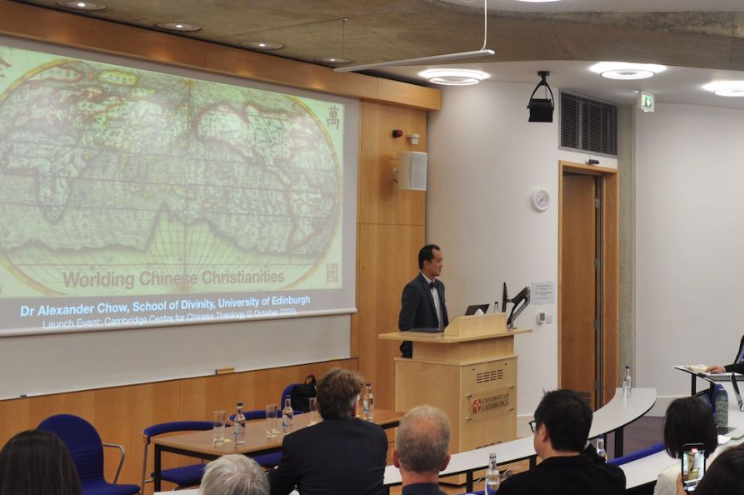As ChinaSource readers will know, recent years have witnessed the emergence of a new generation of Chinese theologians and multidisciplinary scholars of Christianity. Their cosmopolitan outlook, theological training, and allegiance to both the universal Church and the Church in China stand in stark contrast to the intellectual inheritance of an earlier generation of academic theologians in mainland China whose works—nevertheless—inspired their younger successors. Among these Christian scholars are those who have newly embraced denominational identities, begun to promote interdisciplinary dialogue beyond traditional theological–philosophical impasses, and reopened a robust debate about the role of faith in scholarship, Chinese church history, and contemporary life.
One of them is Dr. Simeon (Ximian) Xu 徐西面, a graduate of the University of Edinburgh's School of Divinity, where he completed his Master of Divinity (first-class honors), Master of Theology in History (with distinction), and PhD in systematic theology, with a dissertation on the Dutch Neo-Calvinist Herman Bavinck. Xu's scholarly publications and research interests span a wide array of themes and disciplines from historical theology to contemporary theology and artificial intelligence (cf. the recent issue of ChinaSource Journal here). Along with Professor David Fergusson OBE, DD, FRSE, FBA, Regius Professor of Divinity at the University of Cambridge, Xu is a founding co-director of the Cambridge Centre for Chinese Theology, which was formally launched on Thursday, October 2, 2025, and is funded through a substantial grant from Lux Mundi Inc. (USA).
Xu, a native of Wenzhou, introduced the various activities that the Centre will host—from international collaborative research projects and promoting emerging scholars in the field, to workshops, symposia, and special lectures. The first of these special lectures was given by Dr. Alexander Chow of the University of Edinburgh on the occasion of the launch, a celebration attended by representatives of religious organizations, as well as theologians, historians, and scholars of religion from Cambridge and around the world.
In his lecture, Chow explored the concept of "Worlding Chinese Christianities," emphasizing the rich diversity and historical context of the field's history through an engaging narrative of a multiverse—traveling scholar (echoing a well-known article by Andrew Walls, a pioneer in the field of World Christianity). He examined the interplay between grassroots practices and formal theology, addressing significant periods in the history of Christianity in China from the Tang dynasty to contemporary diasporic communities. Chow highlighted two major themes: the impact of empire-building—both Western and Chinese—on the development of Chinese Christianities, and the influence of a Confucian imagination on Chinese theological expressions. He advocated for a broader, more inclusive understanding of theology that engages lived experiences and diverse cultural contexts within the framework of a global Christian identity.
In the responses following, Jörg Haustein, Professor of Global Christianity at the University of Cambridge, noted that while the field of World Christianity often celebrates cultural particularity, it must also recognize the shared elements that bind Christians across different contexts. Chloë Starr, professor of Asian Christianity and Theology at Yale Divinity School and well-known voice in the field, added to the conversation by questioning the effectiveness of a unifying discourse that attempts to encapsulate the diverse array of Chinese Christianities. Finally, Kevin Xiyi Yao, professor of World Christianity and Asian Studies at Gordon-Conwell Theological Seminary, reminded the audience of the value of sociological "middle-range theory" in understanding contemporary Christianity in China.
During the Q and A session that followed, one scholar raised an interesting question: during a recent visit to China, where he often lectured, a student had asked him in a public forum what he thought of the Sinicization of Christianity. "This is a word that, in all the discussions on Chinese theology and lived Christianity, hasn't fallen at all this afternoon," he noted (my paraphrase). He then went on to ask the panelists at the launch how they explained this term, "Sinicization." I was struck by the question: even someone who didn't specialize in Chinese Christianity was familiar with the ubiquity of the term, the weight it carried in official PRC discourses on Chinese religion and religious studies. I also knew, however, that the omission of the term was not accidental. Many colleagues I have raised this question with in recent years have been reluctant to use the term Sinicization (中国化) anywhere in the vicinity of their research related to China and Christianity, and based on the answers that this questioner was given, we can easily understand why. In addition to the general response – that Sinicization essentially encapsulates China's contemporary religious policy and United Front approach to all things religious organization (including religious studies at state institutions, focused particularly on Protestantism, Catholicism, and Islam with their still living overseas ties) – Chow raised another angle, namely to understand Sinicization more narrowly in the context of TSPM (theological) campaigning, as a continuation of Bishop Ding Guangxun's theological reconstruction (神学建设) of the 1990s.
Other audience members brought the discussion back to the realities faced by Chinese churches and Christians both in China and abroad, seeking to know how the bridges between faith and scholarship, theology and lived religion, will be built through the projects the Cambridge Centre for Chinese Theology will engage. Xu Ximian, who hails from China's probably best-known of "Christian" cities and draws on a wealth of academic experiences and international networks, is well situated to lead this center in new directions that will address precisely these crossroads: Chinese/"Sinophone"/中华 (translated in the English name of the Center) faith meeting academic scholarship in the contemporary world – in the hallowed halls of the University of Cambridge.
Lectures and workshops exploring topics such as the denominational identity of Chinese Christianities, science–religion dialogue in Chinese contexts, and Bible translation and knowledge transfer are being planned. Professor Thomas Qu Xutong's lecture, "The Wind Blows Where It Wishes, and Each Bears Its Proper Form: A Theological Account of 'Neo-Denominationalization' in Chinese Protestant Christianity Today," was held the following week.
Originally from the ChinaSource
CCD reprinted with permission












